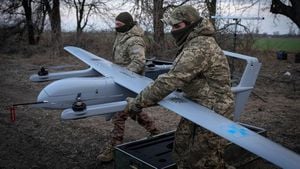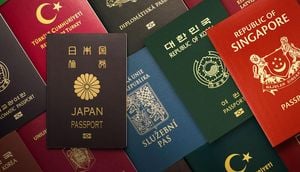Martial law has gripped South Korea as President Yoon Suk Yeol takes drastic measures amid mounting political tensions. The unexpected move, which included allegations against the opposition party of conspiring with North Korea, has raised alarm bells both domestically and internationally, particularly within the Biden administration. For decades, South Korea has been one of the most significant allies of the United States, serving not only as host to nearly 30,000 American troops but also as a pillar of democracy against rising authoritarianism in the region.
The White House has maintained close ties with South Korea, often viewing it as a model democracy. President Biden has frequently emphasized this alliance, particularly as he utilizes South Korea's strategic position against threats from North Korea, China, and Russia. He initially chose South Korea as the first non-U.S. venue for his international Summit for Democracy, reinforcing its importance on the global stage.
After President Yoon's surprising declaration of martial law, the U.S. faced one of its most significant challenges with its South Korean partner. Mr. Yoon's assertions against the opposition party, coupled with his law enforcement approach, have put the Biden administration at a crossroads. Previously, President Biden has framed his foreign policy through the lens of democracy versus autocracy, making the current situation particularly disheartening.
The announcement of martial law caught many by surprise. Hours after Yoon’s declaration, the U.S. National Security Council released a concise statement outlining their concerns and affirming their commitment to monitoring the developments closely. "The U.S. was not notified in advance of this announcement. We are seriously concerned by the developments we are seeing on the ground," the statement read, reflecting the tension and uncertainty surrounding Yoon's bold move.
Yoon's sudden call for martial law has not only shocked allies abroad but also heightened speculation about the domestic motivations behind such actions. Political analysts suggest he may have timed the declaration to coincide with President Biden's international travels, which could limit the immediate diplomatic fallout. Yoon's approval ratings have been decreasing since his narrow victory in the 2022 election, leading to fears among experts and citizens about the stability of his administration.
Adding to the intrigue, there is concern over potential parallels between Yoon's actions and those of former President Donald Trump during the challenges to the 2020 election results. Critics of Yoon argue his approach echoes Trump's attempts to undermine lawful democratic processes, raising alarm over the state of democracy not just in South Korea but across the world.
At diplomatic events concerning U.S.-Japan relations, U.S. deputy secretary of state Kurt Campbell reaffirmed the strong nature of the alliance with South Korea. "Our alliance with the R.O.K. is ironclad, and we stand by Korea during their time of uncertainty," he stated, alluding to the shared values and challenges faced by both nations. Campbell emphasized hope for peaceful resolutions to the political strife, initially dismissing drastic measures like martial law within the democratic framework.
The timing of the martial law declaration is particularly poignant, as it came shortly after the United States hosted its Summit for Democracy, championed by Secretary of State Antony Blinken. Blinken, during his remarks, highlighted South Korea's rapid evolution from dictatorship to one of the world's most dynamic democracies. His statements at the summit underscored the importance of South Korea as not only a strategic and military ally but as a living example of democratic growth.
While the internal political strife continues, the United States is faced with pertinent questions about its military presence and strategy in South Korea. American soldiers stationed at the Demilitarized Zone between North and South Korea and throughout the country have been put under scrutiny due to the unexpected domestic upheaval. How the Pentagon decides to navigate this situation remains unclear and could have lasting implications on American military policy and presence.
President Biden has been increasingly focused on establishing deterrents against Chinese influence and aggression, fostering alliances around shared democratic principles. His administration has engaged actively with Yoon, pushing for unity and stability within the region. The recent martial law declaration has undoubtedly stirred fears over the volatile nature of the current geopolitical climate.
Recently, President Yoon, speaking on the importance of trilateral security partnerships, stated, "the ties between our three countries, which are the most advanced liberal democracies in the region and major economies, are more important than ever." Yoon's efforts to maintain strong relations with the United States and Japan indicate his desire to bolster regional security, but the viability of these bonds will be tested as political realities shift.
The situation marks not only a dangerous turn for South Korea's domestic politics but also places immense pressure on the Biden administration to respond effectively. Managing this crisis is key for Biden's presidency, especially as his approach to counter authoritarianism on the global stage is challenged by the actions of one of America’s closest allies. The world watches closely as developments continue to emerge from the Korean Peninsula.
Overall, Biden's administration must juggle support for South Korea, uphold democratic values, and respond to Yoon's surprising decision to impose martial law. The Biden White House's approach to this crisis could redefine future U.S.-South Korea relations and test the commitment to democracy it has long espoused. For now, the balance of power, political stability, and the strength of alliances hang precariously on the outcomes of this unexpected declaration.
With both nations having invested significant resources and political capital, how the situation plays out will shape not just Northeastern Asia but potentially provide lessons on international relations and the resilience of democratic governance under pressure. The coming days and weeks will be pivotal not only for South Korea's democracy but also for the integrity of U.S. foreign policy and its alliances.



